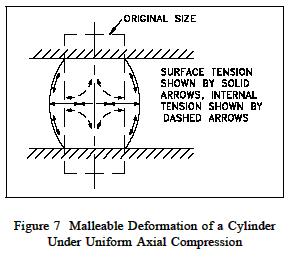|
Where ductility is the ability of a material to
deform easily upon the application of a
tensile force,
malleability is the
ability of a metal to exhibit
large deformation or plastic response when
being subjected to compressive force.
Uniform compressive force causes
deformation in the manner shown
in Figure 7. The material contracts
axially with the force and expands
laterally. Restraint due to friction at the contact faces induces
axial tension on the outside. Tensile
forces operate around the circumference with the lateral
expansion or increasing girth. Plastic
flow at the center of the material also induces tension.

Therefore, the
criterion of fracture (that is, the limit of plastic deformation)
for a plastic material is likely to depend on tensile rather than
compressive stress. Temperature change may modify both the plastic
flow mode and the fracture mode.
|